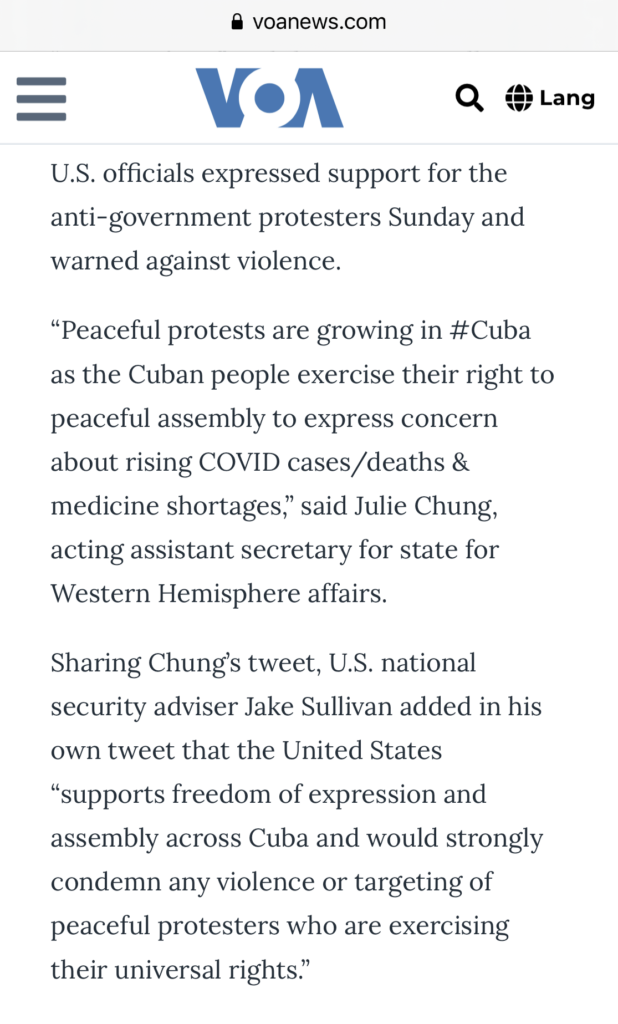Biased Voice of America VOA News report does not quote a single protester, gives Castro regime the last word, ignores criticism from Senator Rubio
USAGM Watch Commentary
The Voice of America VOA News English-language report, titled “Rare Protests Hit Cuba Amid Economic, Coronavirus Crises,” carries Havana, Cuba dateline, but the report does not quote a single anti-Castro regime Cuban protester. The report, which extensively quotes Cuban regime officials making accusations against Cuban-Americans and the American government, does not mention criticism from Republican members of Congress, including Senator Marco Rubio (R-FL), who said that Biden Administration officials who were blaming the protests on COVID were trivializing decades of repression and brutality of the communist Castro regime. Raul Castro who stepped down earlier this year as the head of the Communist Party of Cuba is still the most influential figure on the island.
While economic problems and shortages were mentioned, there was not a single reference in the VOA report to communism and socialist state economy in Cuba. The report focused on the Cuban regime’s criticism of U. S. sanctions imposed by the Trump Administration but did not note that they were imposed in response to human rights violations.
The initial VOA News report was issued late. Much later in the day on Monday, July 12, VOA News posted another report which included references to criticism from Republican lawmakers on Sunday, but the earlier one-sided report was probably used by most of VOA’s foreign language services. VOA News in the mismanaged U.S. Agency for Global Media (USAGM) violated the VOA Charter and helped to spread Castro regime propaganda by ignoring the voices of Cuban protesters, Cuban-Americans and Republican members of Congress.
###
VOICE OF AMERICA – VOA NEWS (ENGLISH)
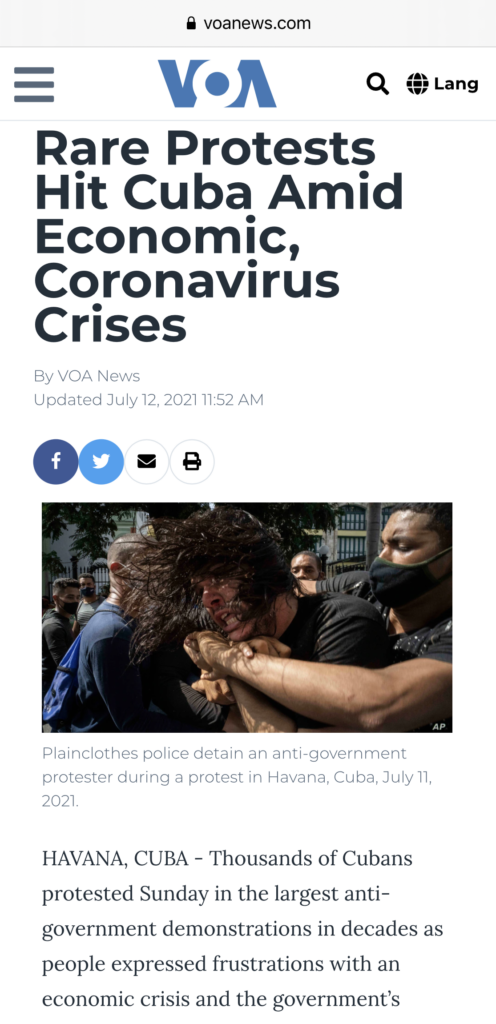
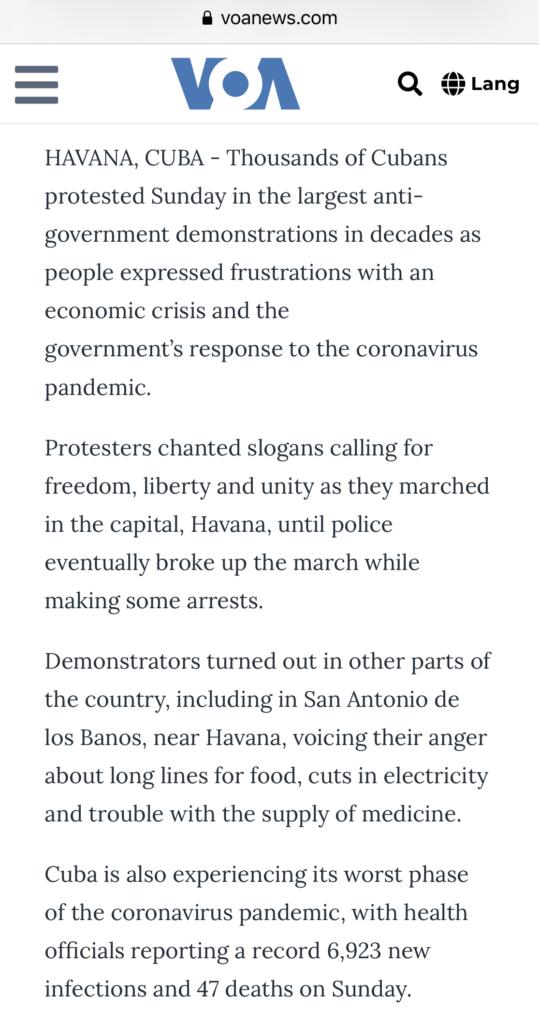
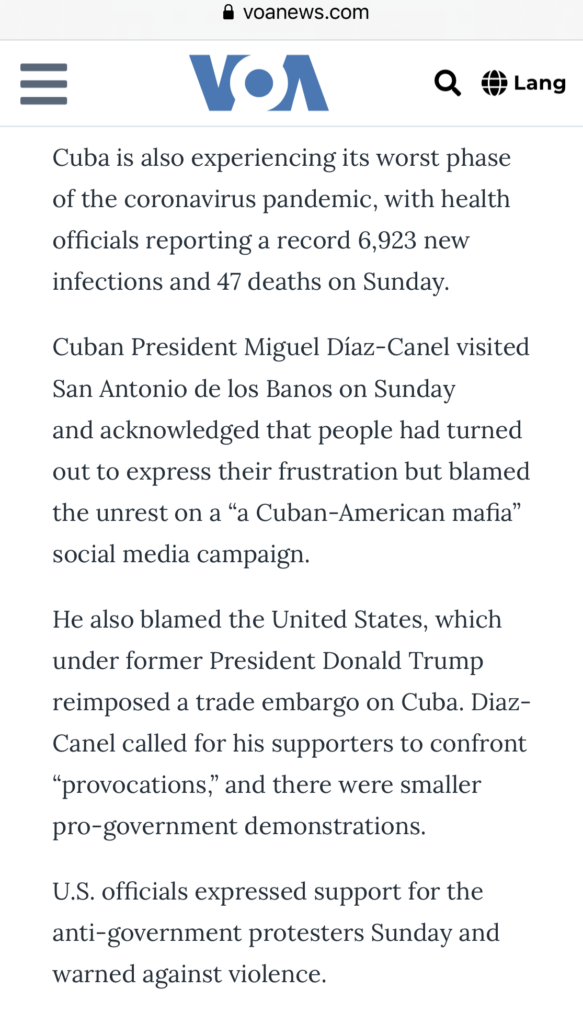
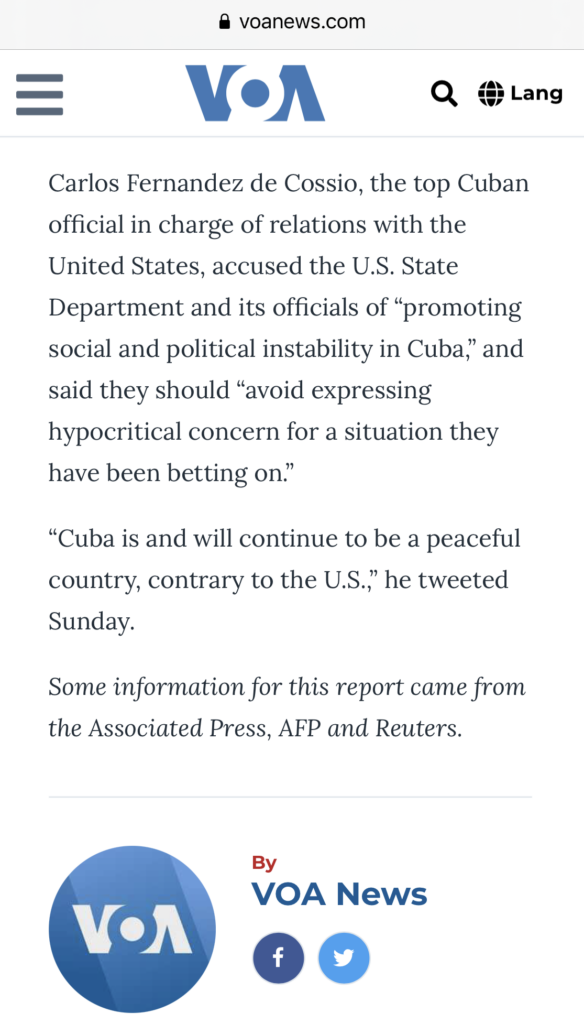

Rare Protests Hit Cuba Amid Economic, Coronavirus Crises
By VOA News
Updated July 12, 2021 04:20 AM
Cuban President Miguel Diaz-Canel (C) is seen during a protest held by citizens demanding improvements in the country, in San Antonio de los Banos, Cuba, July 11, 2021.
HAVANA, CUBA – Thousands of Cubans protested Sunday in the largest anti-government demonstrations in decades as people expressed frustrations with an economic crisis and the government’s response to the coronavirus pandemic.
Protesters chanted slogans calling for freedom, liberty and unity as they marched in the capital, Havana, until police eventually broke up the march while making some arrests.
Demonstrators turned out in other parts of the country, including in San Antonio de los Banos, near Havana, voicing their anger about long lines for food, cuts in electricity and trouble with the supply of medicine.
Cuba is also experiencing its worst phase of the coronavirus pandemic, with health officials reporting a record 6,923 new infections and 47 deaths on Sunday.
Cuban President Miguel Díaz-Canel visited San Antonio de los Banos on Sunday and acknowledged that people had turned out to express their frustration but blamed the unrest on a “a Cuban-American mafia” social media campaign.
He also blamed the United States, which under former President Donald Trump reimposed a trade embargo on Cuba. Diaz-Canel called for his supporters to confront “provocations,” and there were smaller pro-government demonstrations.
U.S. officials expressed support for the anti-government protesters Sunday and warned against violence.
“Peaceful protests are growing in #Cuba as the Cuban people exercise their right to peaceful assembly to express concern about rising COVID cases/deaths & medicine shortages,” said Julie Chung, acting assistant secretary for state for Western Hemisphere affairs.
Sharing Chung’s tweet, U.S. national security adviser Jake Sullivan added in his own tweet that the United States “supports freedom of expression and assembly across Cuba and would strongly condemn any violence or targeting of peaceful protesters who are exercising their universal rights.”
Carlos Fernandez de Cossio, the top Cuban official in charge of relations with the United States, accused the U.S. State Department and its officials of “promoting social and political instability in Cuba,” and said they should “avoid expressing hypocritical concern for a situation they have been betting on.”
“Cuba is and will continue to be a peaceful country, contrary to the U.S.,” he tweeted Sunday.
Some information for this report came from the Associated Press, AFP and Reuters.
END OF VOA News REPORT
